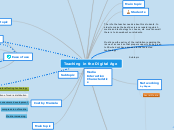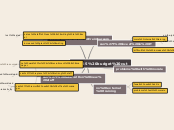Inherent interaction
Control learners repond
based on behaviourist approach
Eg. adaptive learnining
Media Interaction Characteristics
Organizational Issues by Rodrigo
Institutions cannot afford new technologies
Institutions do not adjust the environment for technology
Teachers do not receive training
Institutions do no support the use of technology
User-generated interaction
focused on explicit interaction
No intervention of teachers
Based on constructivism approach
it leads user to interact voluntarity
Ease of use
Reliability
Use reliable softwares
Interface Design
Friendly and intuitive
Orientation
Training on the software that will be used
Computer and information literacy
Basic literacy skills on using the technological tools
designed Interactivity
Kinds of interaction
students & students
students are together in groups
students & teachers
higher learning outcomes
learners & materials
reflective interaction
5. Interaction
It is explicity designed
Eg. web pages
instructors have to intervene
provide feedback
design activities
encourage interaction
Teaching in the Digital Age
Cost by Marcela
Media increasing
compression of media
Rapid consumers development
Cost reduction of media distribution
Discriminator affecting technology
Students by karina
Student demographics
Technology and media depend on the student's needs when making decisions.
Increasing diversity of students requires approaches if their proficiency is to be achieved.
Diverse range of students in higher education is a fundamental change
Subtema
Security and Privacy
The need for balance
Some areas should be carried behind closed doors
Teaching is open and public
Public information has more risk
Cloud based services
Clear set of policies
Privacy is different from security
Social media companies are exclusively based in the US
Contract agreements
Unknown location
Massive servers
Privacy and security when teaching
Communications shall be managed 'in-house'
A strictly controlled environment to manage privacy
Protect students from online harassment or bullying
Private place to work online
Networking
by Roque
Social Media
affects
Course Design in 5 ways
Instructor-Led Open Resources
xMOOC
Self-Managed Groups
cMOOC, Blogs, webinars, wikis
Student Generated Content
Exclusive Social Media
Wordpress, YouTube, Podcast
Suplementing "Standard"
e.g. Chat Inside MOODLE
Students
The info the teacher needs about his students. In order to make the best decisions regarding which media and technology to choose, we must know all there is to know about our students.
Must know the policy of the institution regarding the issue of access so that proper support can be given to SS who dont have access to that selected technology.
Subtopic
Main topic
DIFFERENCES IN HOW STUDENTS LEARN Information We Need by Rudolf
7. What are the previous experiences and attitudes that my SS will probably bring to the program. How likely are those pre notions to be useful and suitable?
6. If I am going to make it mandatory for my SS to pay for their own access to technology, will the teaching approach justify such expenses?
5. What are my expectations about the assumed skills that my SS are to have at the start of the program?
4. When some tasks are to be done on campus, what should the institutaions policies be that regulare the SS access to devices in class?
3. When some tasks are to be done off-campus, determine if SS will have a regular and reliable access to that technology.
2. Must consider the Demographics pertaining to the SS that I am going to teach in order to ascertain the appropriateness of the technology to be used.
1. Must know what the policy of the institution is regarding access issues and how that can affect SS who dont have have accesss to the selected technology.
Teaching and media selection
Aspects to consider
Desired learning outcomes
Complexity of context
Individual differences between learners
Discriminators in media selection
Strong discrimination: Student's access and ease to use multimedia.
Weak discriminator: Teaching effectiveness of multimedia
Principles
Keep it good
Quality of material
Keep it real
Decision making and problem solving
Keep it short
Fragments instead of long-lasting videos
Keep it simple
One idea at a time
Importance
The multimedia's design must lead to effective teaching.









